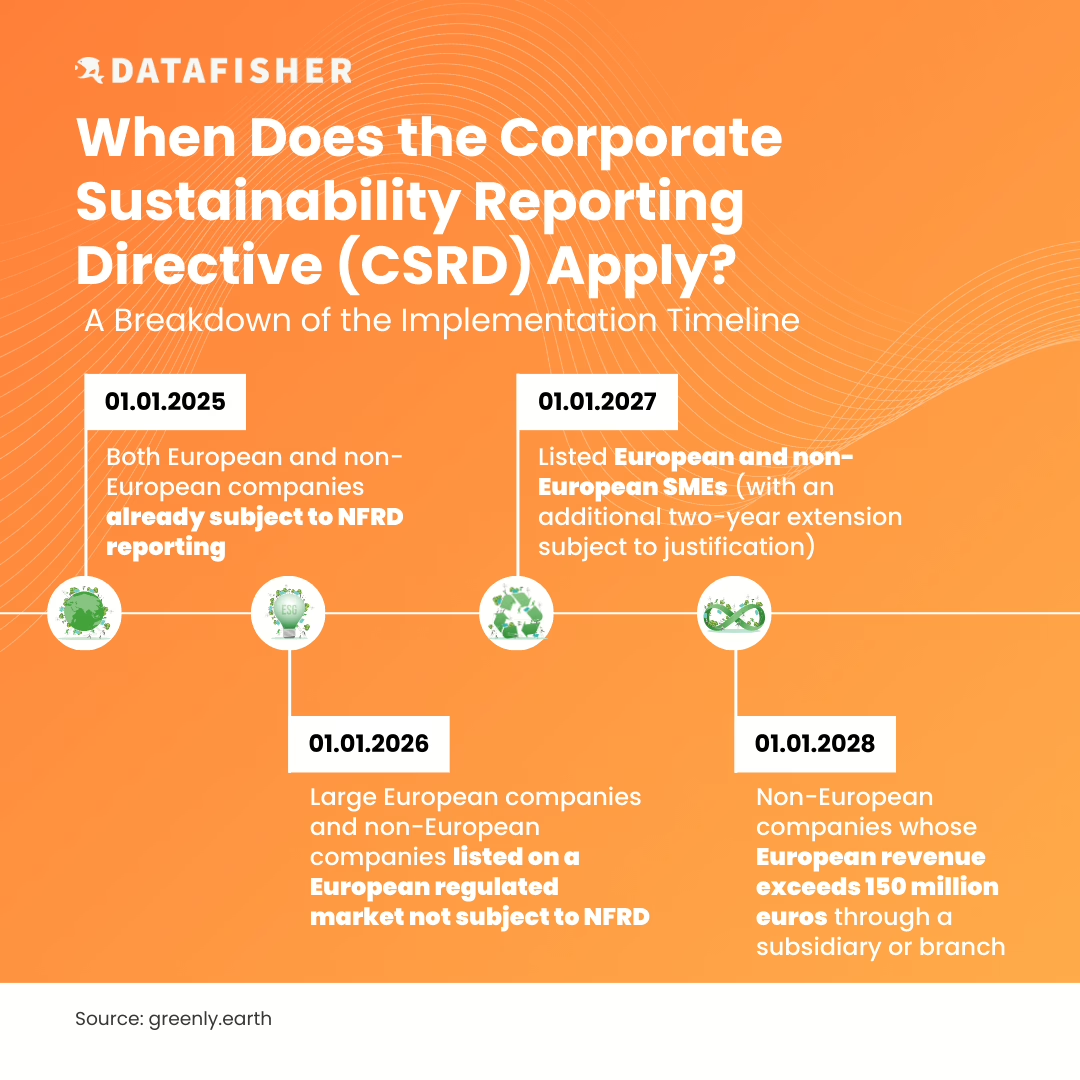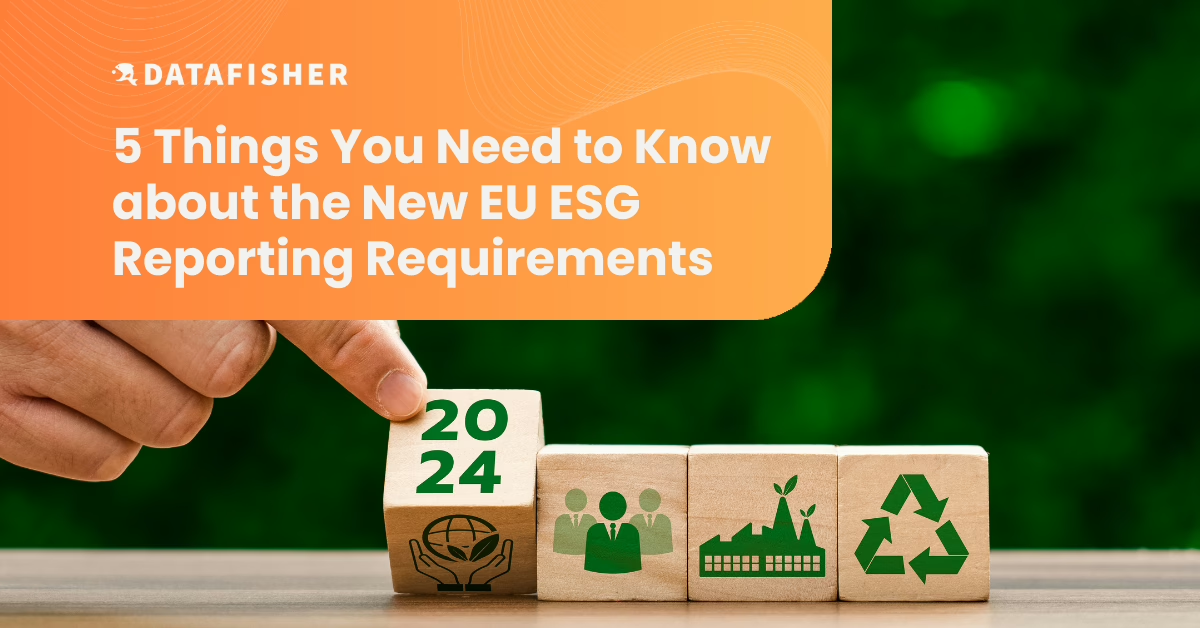The European Union is rolling out sweeping new regulations aimed at increasing transparency around environmental, social, and governance (ESG) factors. These rules will have a major impact on companies and financial institutions operating in the EU that are listed that previously weren’t subject to mandatory non-financial reporting requirements, including public and private non-EU companies that meet certain EU presence thresholds.
As the EU’s expansive ESG reporting mandates take effect, Datafisher is well-positioned to create custom training programs to help companies in these industries navigate the new regulations. Here are 5 key things you need to know:
1. Sustainability Reporting is Becoming Mandatory
The Corporate Sustainability Reporting Directive (CSRD) will require large EU companies and firms to provide detailed reporting on sustainability risks, opportunities, impacts, targets and progress. This builds on the existing Non-Financial Reporting Directive but will be much more comprehensive
The CSRD significantly expands sustainability reporting for large EU companies. It dives deeper into environmental and social impacts, requiring reporting on climate change, resource use, human rights, and employee well-being.
A key innovation is “double materiality,” where companies disclose how sustainability issues affect their business (financials) and how their operations impact society (environment and social). This transparency empowers investors and consumers to make informed decisions.
The CSRD mandates stricter reporting standards and independent verification to ensure credibility. While complying requires initial investment, companies benefit from improved risk management, stronger investor confidence, and a better brand reputation. Ultimately, the CSRD acts as a catalyst for a more sustainable future in the EU.
2. Double Materiality Perspective Required
The CSRD significantly expands sustainability reporting for large EU companies. It delves deeper into environmental and social impacts, requiring disclosures on climate change, resource use, human rights, and employee well-being.
A key innovation is “double materiality.” Traditionally, companies reported on how sustainability issues affected their bottom line (inside-out). Now, they must also disclose the impacts their activities have on people and the environment (outside-in). This holistic view, a core tenet of the new standards, compels companies to consider the full scope of their sustainability performance.
The CSRD mandates stricter reporting standards and independent verification to ensure credibility. While complying requires initial investment, companies benefit from improved risk management, stronger investor confidence, and a better brand reputation. Ultimately, the CSRD acts as a catalyst for a more sustainable future in the EU.
3. Detailed ESG Metrics and Disclosures Expected
The CSRD demands a shift from high-level, qualitative sustainability reporting to a more granular and data-driven approach. Companies will be required to disclose a comprehensive set of Environmental, Social, and Governance (ESG) data points. This goes beyond simply stating a commitment to sustainability; it necessitates concrete metrics that paint a clear picture of a company’s impact.
Environmental factors will be heavily scrutinized. Companies must disclose data points on:
- Greenhouse Gas Emissions: This includes both direct emissions from their operations and indirect emissions from their supply chain.
- Water Usage: Reporting on water consumption across all activities will highlight potential inefficiencies and encourage water conservation efforts.
- Biodiversity Impacts: Companies will need to assess and disclose the potential negative effects their operations have on ecosystems and biodiversity.
Social issues will also be under the sustainability microscope. The CSRD mandates reporting on:
- Workforce Diversity: Detailed data on employee demographics will shed light on a company’s commitment to diversity and inclusion within its workforce.
- Human Rights Risks: Companies must identify and disclose potential human rights violations within their supply chains, demonstrating their commitment to ethical sourcing practices.
This data-driven approach to sustainability reporting fosters transparency and accountability. It allows stakeholders to assess a company’s true sustainability performance and make informed decisions based on concrete evidence, not just empty promises.

4. Rules Will Be Phased-In
While the CSRD is scheduled to begin applying in 2025, the reporting rules will be phased in over several years. Large public companies will go first, followed by smaller companies and different specifications by sector.
5. Assurance Requirements Are Increasing
Eventually, sustainability reporting will need to be audited and validated to the same level as financial reporting. For now, companies can get limited third-party assurance, but strong internal governance and controls will be essential.
With these comprehensive new ESG disclosure requirements, transparency and accountability around sustainability are becoming mandated by EU regulators. Companies operating in the EU will need to take proactive steps and devote significant effort to collecting reliable data and reporting meaningfully on their ESG performance.
Request a 30-minute online meeting with a Datafisher specialist to help navigate the new regulations.
